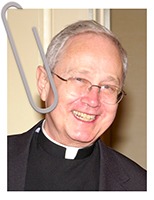We are coming to a time in the church calendar known as “ordinary time”. What does ordinary mean? In the language of the liturgy, ordinary simply means that the Sundays will be numbered rather than named for celebrating special feasts.
However, it is as a good time as any to think about the ordinary saints in our lives and what ordinary holiness means in the context of our lives. In his letter “Rejoice and be Glad’ Pope Francis speaks of holiness in a way that followers of Vincent and Louise can relate to. Here are six insights that struck me…
My modest goal is to repropose the call to holiness in a practical way for our own time…
The Saints next door
I like to contemplate the holiness present in the patience of God’s people: in those parents who raise their children with immense love, in those men and women who work hard to support their families, in the sick, in elderly religious who never lose their smile. In their daily perseverance, I see the holiness of the Church militant. Very often it is a holiness found in our next-door neighbors, those who, living in our midst, reflect God’s presence. We might call them “the middle class of holiness”…
These witnesses may include our own mothers, grandmothers or other loved ones (cf. 2 Tim 1:5). Their lives may not always have been perfect, yet even amid their faults and failings they kept moving forward and proved pleasing to the Lord…
The important thing is that each believer discerns his or her own path, that they bring out the very best of themselves, the most personal gifts that God has placed in their hearts (cf. 1 Cor 12:7), rather than hopelessly trying to imitate something not meant for them.
For you too
This holiness to which the Lord calls you will grow through small gestures. Here is an example: a woman goes shopping, she meets a neighbor and they begin to speak, and the gossip starts. But she says in her heart: “No, I will not speak badly of anyone”. This is a step forward in holiness. Later, at home, one of her children wants to talk to her about his hopes and dreams, and even though she is tired, she sits down and listens with patience and love. That is another sacrifice that brings holiness. Later she experiences some anxiety, but recalling the love of the Virgin Mary, she takes her rosary and prays with faith. Yet another path of holiness. Later still, she goes out onto the street, encounters a poor person and stops to say a kind word to him. One more step…
Let us not forget that Jesus asked his disciples to pay attention to details.
- The little detail that wine was running out at a party.
- The little detail that one sheep was missing.
- The little detail of noticing the widow who offered her two small coins.
- The little detail of having spare oil for the lamps, should the bridegroom delay.
- The little detail of asking the disciples how many loaves of bread they had.
- The little detail of having a fire burning and a fish cooking as he waited for the disciples at daybreak.
The Great Criterion
In the twenty-fifth chapter of Matthew’s Gospel (vv. 31-46), Jesus expands on the Beatitude that calls the merciful blessed. If we seek the holiness pleasing to God’s eyes, this text offers us one clear criterion on which we will be judged. “I was hungry and you gave me food, I was thirsty and you gave me drink, I was a stranger and you welcomed me, I was naked and you clothed me, I was sick and you took care of me, I was in prison and you visited me” (vv. 35-36).
We are all called recognize, celebrate and be “ordinary saints”, “Saints next door”.
I encourage everyone to read the full text.


Wonderful article! Any chance it has been published in Spanish? If not, may I get it translated? I would like to send it out to the associates of the Missionary Cenacle Apostolate, founded by Fr. Thomas Judge, C.M. in 1909. His primary message was that the laity are called to be “apostles in everyday life.” This article could have been written for us!
Fr your article very true we have a moral responsibility to help the poor and hungry .People who believe this some call bleeding hearts who cares